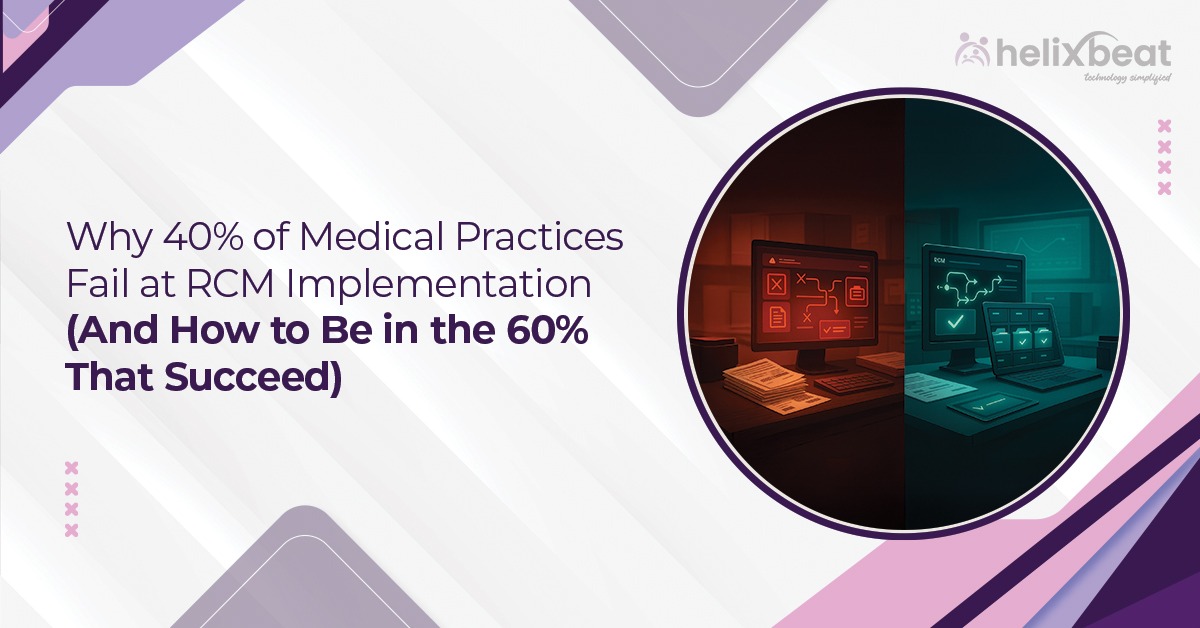Medical practices need financial stability, and Revenue Cycle Management (RCM) helps them achieve this. Simply put, RCM in medical billing covers all the steps that handle financial transactions between patients, insurance companies, and healthcare providers. While RCM is key to boosting profitability and streamlining operations, many practices struggle to implement it well. Let’s take a closer look at why RCM implementations often fall short and what providers can do to fix these challenges.

Table of Contents
What is RCM in Medical Billing?
RCM is a comprehensive system used by healthcare providers to track and manage the flow of payment for services provided to patients. It begins with patient registration, continues with services rendered, and includes the process of claims submission and payment collection. RCM aims to streamline the entire process. A well-executed RCM system can reduce the risk of denied claims, optimize cash flow, and enhance financial performance.
Despite its importance, many healthcare providers face obstacles when adopting effective RCM practices. Here are the common reasons why most practices fail to implement RCM in medical billing.
1. Lack of Proper Training
One of the primary reasons for the failure is insufficient staff training. RCM in medical billing requires a comprehensive understanding of medical codes, insurance protocols, and various billing systems. When medical staff are not adequately trained on how to properly enter data, process claims, and handle denials, it can lead to errors that affect the overall effectiveness of the RCM system.
2. Inefficient Technology Integration
Many medical practices fail to integrate their technology systems effectively, which causes delays and errors in the RCM process. Inadequate or outdated software systems that aren’t properly integrated can result in duplication of efforts, missed information, and data entry errors. This inefficient technology integration leads to more claim rejections and delays in revenue collection.
3. Poor Data Management
Data integrity is important in RCM processes. Incorrect or incomplete patient information—such as outdated insurance details or misspelled names—can lead to claims being rejected or denied. When medical practices fail to maintain clean, accurate data throughout the RCM process, the system can break down quickly.
4. Failure to Follow Up on Denied Claims
One of the biggest reasons many medical practices struggle with RCM is failing to follow up on denied or underpaid claims. When a claim gets denied, it’s easy to get caught up in the daily grind and overlook the need to resubmit or dispute the errors with insurance companies. This lack of follow-up can result in lost revenue and a significant hit to cash flow.
Therefore, managing RCM in medical billing requires not just submission but persistent follow-through to make sure every dollar is accounted for.
5. Poor Communication Between Departments
RCM in medical billing is a team effort, involving various departments such as the front desk, medical coders, billing staff, and physicians. When communication between these teams breaks down, it can result in confusion, delays, and costly mistakes.
6. Underestimating the Complexity of Insurance Verification
Insurance verification is a critical part of the RCM process. If a patient’s insurance coverage is not verified accurately before treatment, it can lead to significant delays in payment or, in some cases, total claim rejection.
Unfortunately, many medical practices underestimate the complexity of this task and fail to thoroughly review coverage details before providing services.
7. Not Keeping Up with Changing Regulations
The healthcare industry is highly regulated, and the rules governing billing, coding, and insurance reimbursements are constantly changing. Medical practices that fail to keep up with these changes often find themselves facing compliance issues, claim rejections, and penalties.
Changes in government programs like Medicare and Medicaid, along with frequent updates to the ICD-10 coding system, can also overwhelm medical practices.
8. Inefficient Billing and Payment Systems
Medical practices that don’t have a streamlined billing and payment system often face challenges when it comes to collecting payments on time. For example, if patients are given several payment options—like check, cash, or credit card—but those options aren’t all linked into one unified system, things can get messy. This disorganization not only causes delays in revenue recovery but also negatively impacts the patient experience.
9. Lack of Regular Performance Monitoring
Many practices fail to monitor the performance of their RCM system regularly. Without periodic reviews and performance audits, it’s difficult to identify where bottlenecks or inefficiencies exist within the RCM process. By failing to track performance, practices miss opportunities to improve their revenue cycle and maximize profitability.
| Reason for RCM Failure | Explanation |
| 1. Lack of Proper Training | Insufficient staff training on medical codes, insurance protocols, and billing systems can lead to errors that affect the effectiveness of the RCM system. |
| 2. Inefficient Technology Integration | Outdated or poorly integrated technology systems cause delays, data entry errors, and missed information, leading to claim rejections and delayed payments. |
| 3. Poor Data Management | Incorrect or incomplete patient data, like outdated insurance details, results in claim rejections or denials. |
| 4. Failure to Follow Up on Denied Claims | Failing to follow up on denied claims leads to lost revenue and damaged cash flow. |
| 5. Poor Communication Between Departments | Breakdowns in communication among departments lead to confusion, delays, and costly mistakes. |
| 6. Underestimating the Complexity of Insurance Verification | Failing to verify patient insurance thoroughly can cause payment delays or claim rejection. |
| 7. Not Keeping Up with Changing Regulations | Not staying updated with regulatory changes in billing, coding, and insurance reimbursements can lead to compliance issues and rejected claims. |
| 8. Inefficient Billing and Payment Systems | Disorganized payment systems with multiple unlinked payment options cause delays in payment recovery and poor patient experience. |
| 9. Lack of Regular Performance Monitoring | Failing to monitor and audit the RCM system regularly leads to missed opportunities for improvements and reduced profitability. |
Why Choose Helixbeat to Outsource Your RCM in Medical Billing?
Helixbeat provides a comprehensive suite of services that streamline your revenue cycle management and prevent financial losses. Here’s how we can help:
1. Patient Registration & Eligibility Verification
By collecting precise data from the outset, we minimize the possibility of errors in billing, thereby making the entire process more efficient.
2. Medical Coding & Billing
Our expert coding services follow the latest coding standards (ICD-10-CM, CPT, HCPCS) to guarantee accurate and compliant claims submissions. This minimizes the risk of rejected claims and delays in reimbursement.
3. Claims Management
Helixbeat provides end-to-end claims submission and tracking services. We handle proactive follow-ups with payers, reducing the chance of missed payments or rejected claims. Our denial management strategies focus on maximizing reimbursements, helping healthcare organizations receive the revenue they’re entitled to.
4. Accounts Receivable (AR) Management
With our AR management, organizations can effectively manage outstanding claims and payments. By streamlining workflows and following up on overdue accounts, we help reduce aging balances and improve cash flow.
5. Denials Management
Our dedicated Denials Management team works to resolve denied claims quickly. They perform thorough root cause analysis, conduct proactive appeals, and track claims in real-time, all while maintaining compliance with industry standards. This helps to maximize reimbursements and minimize lost revenue.
6. Compliance & Regulatory Management
Helixbeat supports compliance with healthcare regulations, including HIPAA and payer contracts, by offering expert assistance, internal controls, and audits. This reduces the risk of non-compliance and ensures that your organization stays on top of industry standards and regulatory changes.
Final Thoughts
RCM in medical billing is necessary for the financial success of medical practices. Providers looking to optimize their revenue cycle management can make a real difference by partnering with the right tools and experts. Helixbeat offers advanced RCM solutions that streamline the process and enhance both efficiency and patient satisfaction. Let Helixbeat help your practice thrive.
FAQs
1. What are the key steps involved in RCM in medical billing?
Key steps in RCM in medical billing include patient registration, insurance verification, charge capture, coding, claim submission, payment posting, accounts receivable management, and patient collections.
2. How does RCM in medical billing improve revenue collection?
RCM in medical billing streamlines the billing and claims process, reduces errors, and ensures timely follow-ups. This leads to faster and more accurate reimbursements, improving cash flow and reducing the risk of claim denials.
3. What are the common challenges in RCM in medical billing?
Common challenges include issues with inaccurate coding, patient eligibility verification, claim rejections, delayed payments, and managing large volumes of claims. Effective RCM processes can help mitigate these challenges.
4. Can outsourcing RCM in medical billing improve financial outcomes?
Yes, outsourcing RCM in medical billing allows healthcare practices to focus on patient care while experts handle the billing process, improving accuracy, reducing administrative costs, and speeding up reimbursement cycles.














